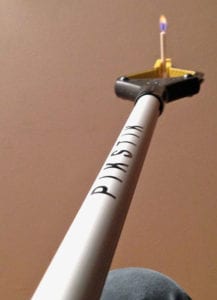Since then, I’ve discovered that chronic is complicated, ongoing, unresolved, toilsome, misunderstood. Picture the bad swimmer in the deep end: panicky splashing, head above water, reaching for the safety of the ladder, but not in serious danger. That’s me, much of the time, though I downplay distress. In rare times of extreme need, I crack the chronic-to-crisis barrier, but most situations don’t rate high alert. Within the medical model, the goal is to fix the problems that I present, and I’m a cipher, it seems. I’m not in remission. I’m far from healthy. I experience symptoms that can’t be explained, etiology unknown. We pour over tests and juggle my meds. I occupy a kind of limbo that physicians find frustrating. That my family and friends find troubling. That I, myself, find fatiguing. As a “progressive chronic,” there’s no relief in sight.

Don’t cry for me, Argentina. Like any stalwart activist, I’m trying to reclaim that label, even as I struggle to live it. Living is chronic, if we are lucky. And I count myself as lucky.
I am still touched by the letters people wrote, the conversations I had, and the tears we shed when I was first diagnosed. My family rented a vacation house with a bay view in Rhode Island, and we all gathered to process the news. My wife and her sister trekked to Machu Picchu with me in mind. A friend took a photo of my atrophied spine to Sansepolcro, one of my favorite towns in Italy. Those early, lovely gestures warm me like distant memories. Every time I’ve been hospitalized, help descends, in droves. It is comforting to know that people will come when I sound the alarm.
What’s between 911 and 411? That’s what I’m trying to figure. And why do I privilege crisis over chronic? Instead of dialing the fire department, I now track down the repair guy when the elevator is out, and then finish my to-do list while I wait. When my wheelchair breaks, I call the bike shop across the street for a quick fix so that I can keep on moving. Would-be emergencies have become problems to be solved. That’s a measure of my growth, an increased ability to cope. It’s hardly heroic. It’s not flashy. It’s the daily grind.
Because my condition is chronic, I always need help. (Except when I don’t. And even then, I just might. Especially if you ask.) So I appreciate the kindness of the local pet store owner, the store with impossibly steep stairs, who delivers dog food when I call in advance. I cherish the old friend who surprises with pizza and beverages, for no particular reason. I’m grateful for the neighbor who unloads the car, saving me an extra trip.
In crisis, skilled professionals stand at-the-ready. With the ubiquity of chronicity, we have to help each other. It takes awareness and patience. And it may be as small and as important an act as retrieving that just-out-of-reach toilet paper on the top shelf of the grocery store on the evening of my latest birthday when I was completely spent and really needed the gift of pragmatism in two-ply form.

Randy,
I am very thankful that you’ve found a forum to share your deepest thoughts. I know it brings me closer to you, and I hope others take great comfort in your direct and unadulterated commentary.
Though many miles apart, the Johnson brood thinks of you every day and are ready at a moment’s notice to provide support, air coverage and, yes, even two-ply as needed.
Getting to know the inner you through your writing is a privilege, dear Randy. We, your friends, mostly see the intrepid, resilient you face each challenge, bounce back, and carry on. I’ve missed spending time with you two. Let’s remedy. Love, Chris
Another excellent blog, Randy. You’re changing the way I think about things!
I love your birthday essay, and I love you as a son. You are a gem, Randy. I suffer from old age, for which there is no cure, so we’re in this chronic condition together. I muddle through, thanks to our family, friends, and their philosophical writings. Recently I saw a documentary presented by our friend, David Madison, about Pete Seegers’ amazing 94 years: I was inspired by “Where Have All the Flowers Gone.” It makes me wonder, when will we ever learn?
Ah ha!
Excellent post as always Randy, but I finally found something I disagree with you about.
“That’s a measure of my growth, an increased ability to cope. It’s hardly heroic.”
Not in my book. That description is the essence of heroic.
Toilet paper rolls included.
My dad had Parkinson’s. I guess it isn’t chronic because it is progressive and it did kill him, but the same lesson of ‘it isn’t going to get better’ was brought home to me very profoundly. It does seem heroic to face that reality with any kind of balance. I thought my dad was amazing, he kept on gardening, he went fishing even when it seemed beyond possibility. You demonstrate a remarkable ability to make meaning. Your writing is both full of inspirational content and skilled word-crafting. I appreciate the opportunity to read your work.
Chronically courageous with a touch of understated humility.
Randy, One of our daughters knows you personally and has mentioned you often. Her sister has MS and she is now living with us, her parents. This “chronic” state affects us all. However, your blog has put a perspective on “chronic” that doesn’t often register with us. Thank you for putting this into words so that it will help us (her parents) be more understanding and aware of what she has to deal with daily.